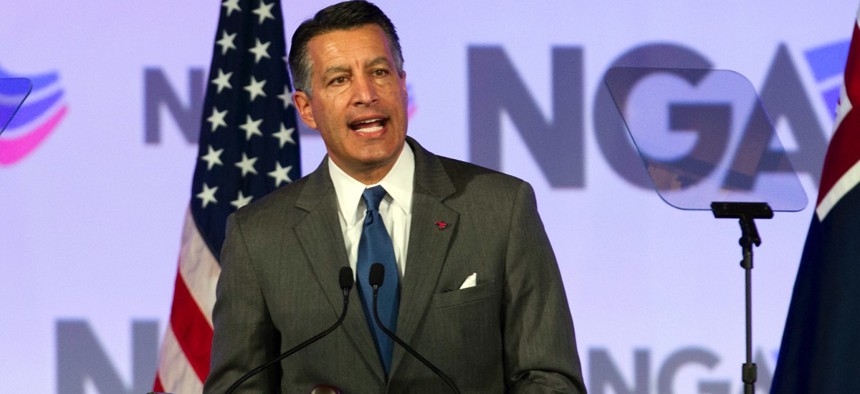Gun Safety Looms Over Governors' Trump Meeting

Nevada Gov. Brian Sandoval, chair of the National Governors Association. Jose Luis Magana / AP Photo
While GOP governors plan to discuss solutions, despite disagreeing on which ones, some Democratic governors suspect the issue will become another ‘bargaining chip’ for the White House.
WASHINGTON — Washington Gov. Jay Inslee said gun safety may become a political bargaining chip for the Trump administration when governors meet with the president Monday at the White House.
Inslee and members of the Democratic Governors Association he chairs held a press conference Saturday morning, at the National Governors Association winter meeting in the nation's capital, where they railed against the lack of Republican leadership addressing gun violence in the aftermath of the Feb. 14 mass shooting at a Parkland, Florida high school.
Washington state recently passed a ban on bump stocks, which accelerate semi-automatic rifles’ rate of fire, but Inslee said Washington, D.C. is “shackled” from similar progress by the sway of the National Rifle Association.
“This is a president whose Homeland Security director, at this meeting one year ago, told me to my face that the Dreamers had nothing to worry about … And now they’re trying to throw the Dreamers out every chance they get, refusing to do anything but using them as a bargaining chip,” Inslee said. “ And I sadly kind of suspect that might be the case here or will be very soon.”
Nevada Gov. Brian Sandoval, a Republican and NGA’s chair, said the Parkland mass shooting and others illustrate the “status quo isn’t working” and praised President Trump for launching the discussion about solutions.
In his own state, Sandoval has signed legislation barring people convicted of domestic violence from purchasing guns and allowing private parties engaging in firearms sales to receive free background checks from dealers. He supports the elimination of bump stocks, like the one used in October’s Las Vegas mass shooting, and said the suggestion of arming teachers concerns him.
“We need to have a national conversation with regard to this, and I think the president has opened the door to that,” Sandoval said. “And that’s a talk we’re going to have on Monday.
Connecticut Gov. Dannel Malloy, a Democrat, said the NRA spent $30 million making sure Trump got elected, questioning the president’s political will to sign legislation requiring universal background checks on all buyers. A Quinnipiac University poll conducted after the Parkland shooting found 97 percent of American voters approve of such a policy.
Malloy pointed out that regardless what action a governor takes, guns can still be transported across state lines.
“No matter what we do in Connecticut, we know the guns change hands in other states and are taken up the I-95 corridor,” Malloy said.
Connecticut's governor was one of four that joined a regional gun safety coalition after the Parkland shooting, a coalition they hope to grow.
Trump, meanwhile, said he’s considering arming school teachers, a policy already in place in states like South Dakota. There the School Sentinel program offers the same law enforcement firearm training given to police officers, which Gov. Dennis Daugaard said might be part of the solution along with possibly raising the purchasing age for firearms.
“I think any governor or federal official that has an idea, those ideas should be explored because we need to do something to stop this violence,” Daugaard said. “Harden schools where we can, arm those willing to be armed—if they can be trained and safely be armed—raise the age at which one can obtain weaponry. I don’t know, those are all possibles. I don’t pretend to have all the answers.”
Inslee accused “a few Republicans” in states like Florida of trying to “cover up 30 years of inaction” because they’re running for office but was all for it if it gets gun safety legislation passed.
Sandoval acknowledged there are political risks involved with Republican lawmakers advocating for tighter gun controls and upsetting the “force” that is the NRA. But still he wants to see a “federal solution” that runs “throughout all the states” and saves lives.
“In the absence of federal action,” Sandoval said. “The states have to act.”
Dave Nyczepir is a News Editor at Government Executive’s Route Fifty and is based in Washington, D.C.
NEXT STORY: Governors Want Room to Shape Health Care Innovation






